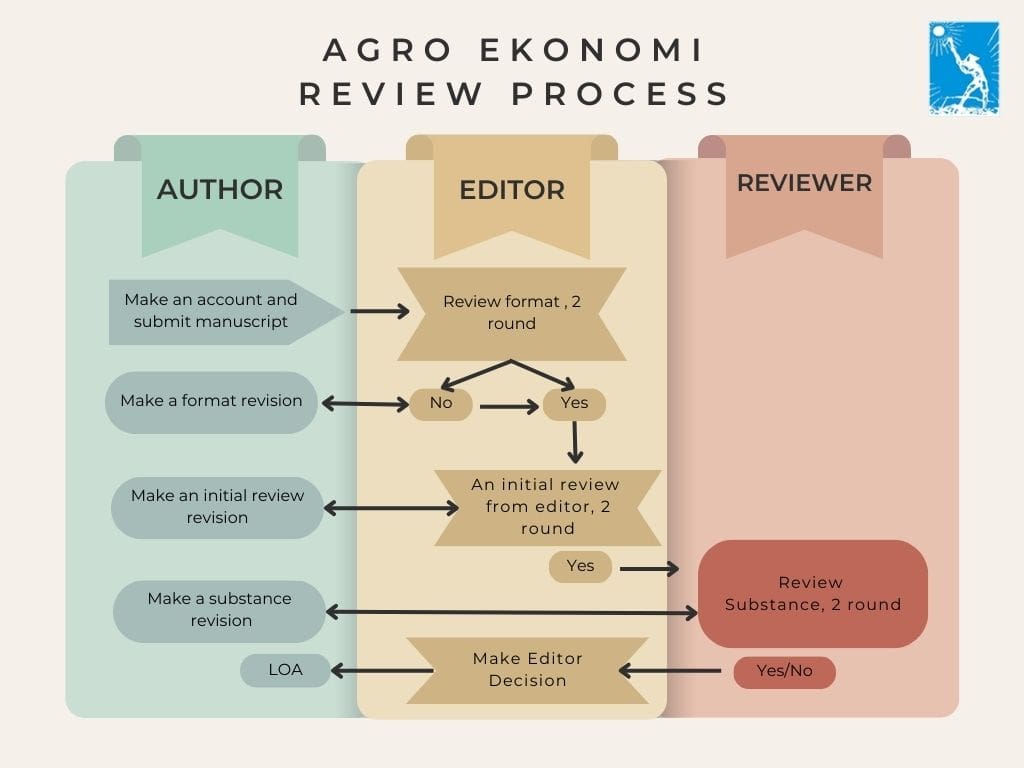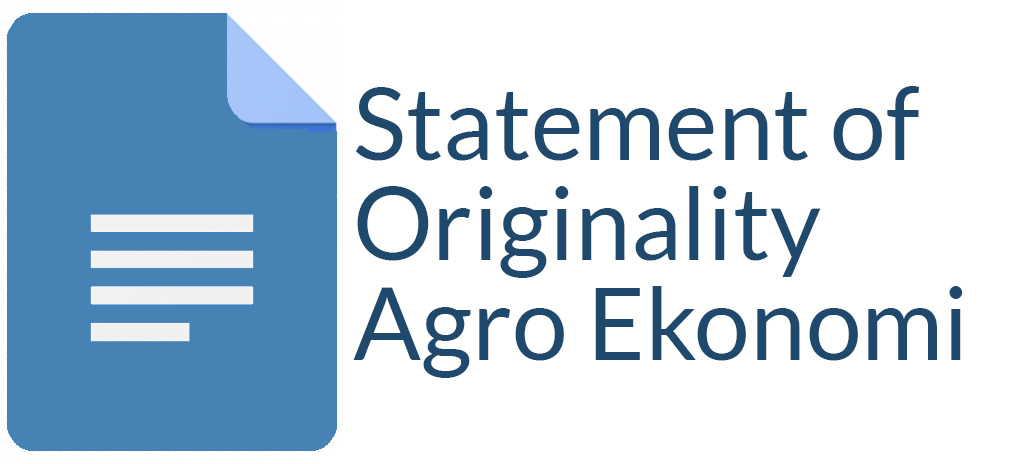Competitiveness of Indonesian Crude Coconut Oil Export in Destination Countries
Tri Fatma Mala Yulhar(1*), Dwidjono Hadi Darwanto(2)
(1) Gadjah Mada University
(2) Gadjah Mada University
(*) Corresponding Author
Abstract
This study aims to examine the competitiveness of Indonesian CCO in destination countries and examine what factors influence the competitiveness of Indonesian CCO in destination countries. The analytical methods used in this research were RCA, EPD, and panel data regression analysis. The time period used in this research was 1996 to 2017. The results of the study concluded that Indonesian CCO had competitiveness in the United States, the Netherlands, Malaysia, China, and Singapore. RCA index in each destination country showed that Indonesian CCO had a very strong comparative advantage. The EPD analysis showed that Indonesian CCO was in a rising star position in the Netherlands, Malaysia, China, and Singapore, while in the United States market Indonesian CCO was in a falling star position. The export volume of Indonesian CCO had positive effect, while trade openness of importing countries and export value of Philippines CCO had negative effect on the competitiveness of Indonesian CCO. The government and CCO exporters need to lobby the destination countries to import CCO from Indonesia, and to convince the destination countries, the quality of the CCO needs to be improved, so that Indonesian CCO will become more competitive than others.
Keywords
Full Text:
PDFReferences
Arumta, N., Mulyo, J. H., & Irham. (2019). The export determinants of Indonesian cut flower in the international market. Agro Ekonomi, 30(1), 41–52.
Balassa, B. (1965). Trade liberalization and revealed comparative advantage. Manchester School, 33, 99–123.
Bustami, B. R., & Hidayat, P. (2013). Analisis daya saing produk ekspor Provinsi Sumatera Utara. Jurnal Ekonomi Dan Keuangan, 1(2), 56–71.
CBI. (2016). Coconut Oil in the Netherlands. Netherlands.
Chaudhary, M. A., & Amin, B. (2012). Impact of trade openness on exports growth, imports growth and trade balance of Pakistan. Forman Journal of Economic Studies, 8: 63–81.
Cvetković, M., & Petrović-Ranđelović, M. (2017). The analysis of agricultural products export competitiveness of the Republic of Serbia based on the RCA index. Economic Themes, 55(3), 399–420.
Departemen Pertanian. (2005). Prospek dan Arah Pengembangan Agribisnis Kelapa. (Badan Litbang Pertanian, Ed.). Jakarta.
Djoni, Darusman, D., Atmaja, U., & Fauzi, A. (2013). Determinants of Indonesia’s Crude Coconut Oil Export Demand. Journal of Economics and Sustainable Development, 4(14), 98–106.
Estherhuizen, D. (2006). An Evaluation of The Competitiveness of the South African Agribusiness Sector. Dissertation. University of Pretoria.
FAOSTAT. (2019). Production (Crops) Coconuts Commodity Statistic. Retrieved from http://www.fao.org/faostat/en/#data/QC
Hamid, M. A., Ahamad, W. M. A. W., & Sahari, Y. (2018). National coconut conference 2018: empowering coconut industry. In Mechanisation package for coconut trough innovate technology (p. 34). Perak, Malaysia.
Hossain, M. A., Chowdhury, S. M., Rekhu, Y., Faraz, K. S., & Islam, M. U. (2012). Biodiesel from coconut oil: a renewable alternative fuel for diesel engine. International Journal of Chemical and Molecular Engineering, 6(8), 524–528.
Kalu, U. D., & E, A. Joy. (2015). Does trade openness make sense ? investigation of Nigeria trade policy. International Journal of Academic Research in Economics and Management Sciences, 4(1), 6–21.
Kementerian Perdagangan. (2013). Market Brief: Kopra dan Olahannya di Jerman. Germany: Indonesia Trade Promotion Center Hamburg.
Kiganda, E. (2017). Analysis of the relationship between trade openness and economic growth analysis of the relationship between trade openness and economic growth in Kenya. Journal of Economics and Sustainable Development, 8(2), 121–137.
Lamaj, J. (2015). The Impact of International Trade and Competition Market on Developing Countries. Italy.
Lima, R. da S., & Block, J. M. (2019). Coconut oil : what do we really know about it so far ? Food Quality and Safety, 3(2), 61–72.
Lotfi, B., & Karim, M. (2016). Competitiveness determinants of Moroccan exports: quantity-ased analysis. International Journal of Economics and Finance, 8(7), 140–148.
Ningsih, E. A., & Kurniawan, W. (2016). Daya saing dinamis produk pertanian Indonesia di ASEAN. Jurnal Ekonomi Kuantitatif Terapan, 9(2), 117–125.
Pilinkiene, V. (2016). Trade openness , economic growth and competitiveness . The case of the Central and Eastern European Countries. Inzinerine Ekonomika-Engineering Economics, 27(2), 185–194.
Pudyastuti, P. A., Sambodo, H., & Windhan, K. (2018). Analisis daya saing ekspor komoditas udang Indonesia di pasar Eropa tahun 2008-2016. Seminar Nasional Dan Call for Paper Sustainable Competitive Advantage (SCA) 8, 8(1), 1–15.
Radityo, S. I., Dwiastuti, R., & Muhaimin, A. W. (2014). Competitiveness of Indonesian natural rubber at world market. Habitat, XXV(3), 143–150.
Riyani, Darsono, & Ferichani, M. (2018). Analisis permintaan ekspor komoditas pertanian Indonesia oleh pasar tiongkok. AGRARIS: Journal of Agribusiness and Rural Development Research, 4(2), 120–128.
Sangeetha, J., Thangadurai, D., Ching, G. H., & Islam, S. (2019). Revitalizing Coconut Industry In Malaysia. In Biodiversity and Conservation: Characterization and Utilization of Plants, Microbes and Natural Resources for Sustainable Development and Ecosystem Management. Canada: Apple Academic Press Inc.
Sari, P. N., & Hartono, S. (2010). Analisis dinamika ekspor minyak nilam Indonesia ke Amerika Serikat. Agro Ekonomi, 17(1), 19–28.
Sukmaya, S. G. (2017). Analisis permintaan minyak kelapa (Coconut Crude Oil) Indonesia di pasar internasional. AGRARIS: Journal of Agribusiness and Rural Development Research, 3(1), 1–8.
Turukay, M. (2009). Analisis permintaan ekspor crude coconut oil Indonesia di pasar dunia. Jurnal Budidaya Pertanian, 5(1), 40–49.
UNComtrade. (2019). Commodity Statistic. Retrieved from https://comtrade.un.org/data/
Wardani, M. A., Mulatsih, S., & Rindayati, W. (2018). Competitiveness and factors affecting Indonesian food industry’s export to regional comprehensive economic partnership. Etikonomi, 17(2), 185–198.
Yu, C., & Qi, C. (2015). Research on the complementarity and comparative advantages of agricultural product trade between China and CEE Countries. Journal of Service and Management, 8(2), 201–208.
Article Metrics
Refbacks
- There are currently no refbacks.
Copyright (c) 2018 Agro Ekonomi

This work is licensed under a Creative Commons Attribution-ShareAlike 4.0 International License.
View My Stats











